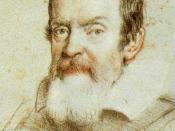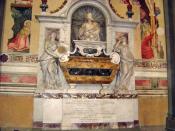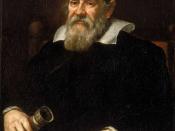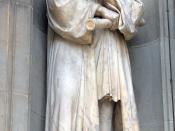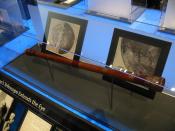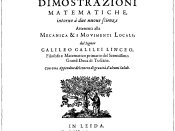Galileo Galilei A long time ago, on Feb. 15, 1564, a child was born in the beautiful city of Pisa, Italy. This child would have a great impact on the world. He would travel far and see many things. His schooling would also take place away from home. But it would be worth it for he would discover and invent many brilliant ideas and machines. His name was Galileo Galilei and he was a great man who stuck with his ideas and spread them to the world.
Galileo's birthplace was Pisa but soon after he was born the family moved to Florence. He lived there for a while with his parents and siblings. After completing grade school in Florence it was time for him to move on. He left home and headed for an old home where he would spend four years schooling, the University of Pisa. On Sept. 5, 1581 he enrolled at the University of Pisa.
He was a student of the "Arts"� and also studied medicine at his father's wishes. After four years of studies he returned home empty handed. In other words he was not able to receive his degree and went back home without it.
After being home for a while Galileo decided to go on another journey and in 1587 he took his first trip to Rome. There in Rome he met Christoph Clavius. In Rome he discovered and invented many things. One of his first discoveries was the propositions about the centers of gravity. He stated "The earth revolves around the sun due to gravity"�. His works go beyond those of Archimedes. The next thing he discovered in 1593 was an invention. He invented a machine that raises water. It was a pump driven by horses. And in 1594 he received a patent on it. A year after he received the patent he discovered how the tides are linked with the moon. Shortly after that he retuned home.
In 1615 he returned back to Rome to defend himself. His Copernican ideas on the universe had been criticized and he went back to defend these ideas. He was especially criticized by the church who hated these ideas that went against their beliefs. Galileo wrote to the church stating that "the distances covered in natural motion are proportional to the squares of the number of time intervals, and therefore, the distances covered in equal times are as the odd numbers beginning from one." After he was done defending himself he went back to being a great scientist. His next machine that he built was a telescope that he built and observed celestial objects with. It had a magnifying power of about 40. With it he studied Saturn and the phases of Venus. He also observed the sun's spots. " I've never seen a more beautiful thing"� he said concerning the sun.
Again Galileo had an encounter with the church. They were much angrier now. The church put him on trial and the tribunal made him take back his Copernican ideas and theories or else he would be condemned. Galileo was extremely upset with this opposition to his beliefs. He was sent into exile and would not be allowed to return home till he took back his ideas. So he took back his ideas(recant) but never actually withdrew his belief in them so they lived on.
Eventually Galileo restated his Copernican ideas and some new ideas also. He did this in a book he wrote in 1633 call The Two New Sciences. The book was written in dialogue form and all the discussions are divided into four days. The First Day is about mechanical resistance of materials, and the atomic constitution of matter. There are also long discussions on the question of vacuum and on the vibrations of pendulums. During the Second Day all these things and other topics are discussed in a mathematical way. The third day is just more of the same. On the forth day Galileo proves that the longest shot of a cannonball occurred when the cannon was set at an angle of 45 degrees. He figured this out by finding that the motions of the cannonball in the vertical and in the horizontal directions "can combine without changing, disturbing or impeding each other" into a parabolic path.
The forth day was also when he discussed his once recanted Copernican ideas. He talked about how the universe was structured along the patterns of geometry. He could have had experimental verification of the law of free fall, which he found mostly on theoretical basis, but it is not known if he did so at that time. He was a Christian Platonist as far as scientific method was concerned. This Christian faith said the world was a product of a personal, rational Creator who disposed everything according to weight, measure, and number. This is why he praised Copernicus repeatedly for his belief in the voice of reason, although it contradicted sense experience.
After Galileo had published this book it was no use for the church to bring him back to the tribunal for even if he was killed his ideas were already out. His book would keep spreading his ideas if he was dead or not. Beside that, he was now very old, at the age of 76, and the church knew he would die soon anyways. He would be almost totally blind for the next 2 years. Galileo had given his brilliant thoughts to the world and his mission was complete. So on January 8, 1642 at the age of 78 Galileo died.
